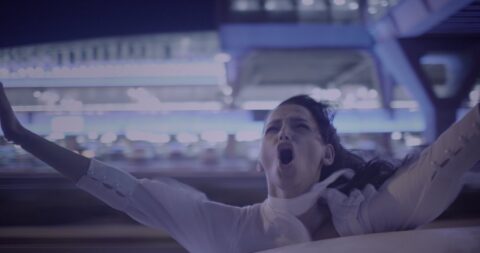Part car simulator game, part stoner comedy, part arthouse riff on the troubled masculinities and loneliness at the heart of Taxi Driver (Martin Scorsese, 1976), the strange Iranian film Critical Zone (Ali Ahmadzadeh, 2023) takes us in and out of the Iranian underworld; showing us its outsiders, reprobates, hangers-on, losers, drug dealers and smugglers, prostitutes and addicts. Unconcerned with polemic or plot, it’s a slow, hazy exploration of Tehran’s seedier side that is as sleep-inducing as smoking hashish itself.
This competition entry film starts promisingly enough. A long take, reminiscent of Solaris (Andrei Tarkovsky, 1972), follows an ambulance through a fluorescent, ugly, dingy tunnel, before turning into a side corridor. Two men get out. They are drug smugglers and this is a distribution centre. Amir (Amir Pousti) is one such dealer, arriving home with copious amounts of hashish, cannabis, opium, cocaine and various other assorted drugs. Constantly seen with a joint in his mouth, he assembles baggies, pre-rolled cigarettes, and muffins to put on sale.
He’s a lonely man, underplayed by Pousti as he plays with his adorable pug Mr. Fred and drives endlessly around the streets of the city. Arguably his biggest companion is his GPS system, which curiously keeps telling him to make a U-turn. Using sparing music, sped-up and down dashboard angles and a sombre colour palette, half the screen perpetually covered in hashish smoke, Ali Ahmadzadeh uses this conceit to explore the liminal spaces of Iran’s capital city, taking us through airports, old people’s homes, empty highways, red-light districts and more. Amir also appears to double up as an unofficial taxi driver, acting as a street angel for the weak and crumbling people around him.
But I kept waiting for the film to move up a gear, and give Amir something to hold onto, but Ahmadzadeh prefers observation to investigation, providing us with a muted, often stultifyingly dull experience.
Critical Zone, with its headscarf-less women, copious drug use, sex references and alcohol drinking, deserves some credit for disobeying official censors in showing a different side to Tehran — one that exists outside the authoritarian control of the Islamic region. And unlike most contemporary Iranian cinema — especially those packaged for festival premieres — there is no central dilemma to be dissected over the course of the runtime. Which is refreshing.
Instead, the film floats in and out of different stories, its intense focus on the world inside Amir’s perpetually hotboxed-car evoking both Abbas Kiarostami’s Ten (2002) and Jafar Panahi’s Taxi (2015). But while the cinema of those two directors rests upon the vitality of their cast, Critical Zone, apart from one particularly Lynchian car chase, is a remarkably subdued work; making the same mistake as Amir himself. High on its own supply, it shrouds the audience in second-hand, second-rate smoke.
Redmond is the editor-in-chief of Journey Into Cinema.
